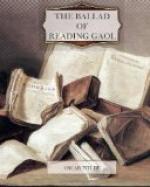Or Titian’s little maiden on the stair
White as her own sweet lily and as tall,
Or Mona Lisa smiling through her hair,—
Ah! somehow life is bigger after all
Than any painted angel, could we see
The God that is within us! The old Greek serenity
Which curbs the passion of that level line
Of marble youths, who with untroubled eyes
And chastened limbs ride round Athena’s shrine
And mirror her divine economies,
And balanced symmetry of what in man
Would else wage ceaseless warfare,—this
at least within the span
Between our mother’s kisses and the grave
Might so inform our lives, that we could win
Such mighty empires that from her cave
Temptation would grow hoarse, and pallid Sin
Would walk ashamed of his adulteries,
And Passion creep from out the House of Lust with
startled eyes.
To make the body and the spirit one
With all right things, till no thing live in vain
From morn to noon, but in sweet unison
With every pulse of flesh and throb of brain
The soul in flawless essence high enthroned,
Against all outer vain attack invincibly bastioned,
Mark with serene impartiality
The strife of things, and yet be comforted,
Knowing that by the chain causality
All separate existences are wed
Into one supreme whole, whose utterance
Is joy, or holier praise! ah! surely this were governance
Of Life in most august omnipresence,
Through which the rational intellect would find
In passion its expression, and mere sense,
Ignoble else, lend fire to the mind,
And being joined with it in harmony
More mystical than that which binds the stars planetary,
Strike from their several tones one octave chord
Whose cadence being measureless would fly
Through all the circling spheres, then to its Lord
Return refreshed with its new empery
And more exultant power,—this indeed
Could we but reach it were to find the last, the perfect
creed.
Ah! it was easy when the world was young
To keep one’s life free and inviolate,
From our sad lips another song is rung,
By our own hands our heads are desecrate,
Wanderers in drear exile, and dispossessed
Of what should be our own, we can but feed on wild
unrest.
Somehow the grace, the bloom of things has flown,
And of all men we are most wretched who
Must live each other’s lives and not our own
For very pity’s sake and then undo
All that we lived for—it was otherwise
When soul and body seemed to blend in mystic symphonies.
But we have left those gentle haunts to pass
With weary feet to the new Calvary,
Where we behold, as one who in a glass
Sees his own face, self-slain Humanity,
And in the dumb reproach of that sad gaze
Learn what an awful phantom the red hand of man can
raise.
O smitten mouth! O forehead crowned with thorn!
O chalice of all common miseries!
Thou for our sakes that loved thee not hast borne
An agony of endless centuries,
And we were vain and ignorant nor knew
That when we stabbed thy heart it was our own real
hearts we slew.




